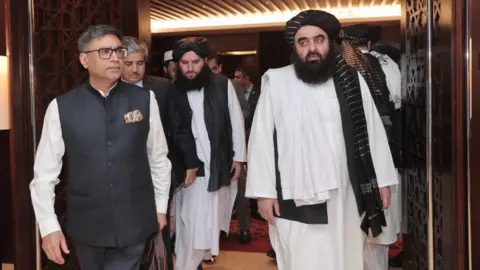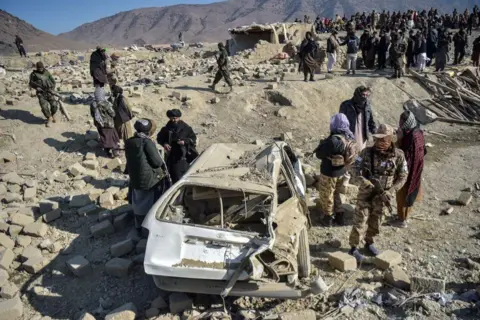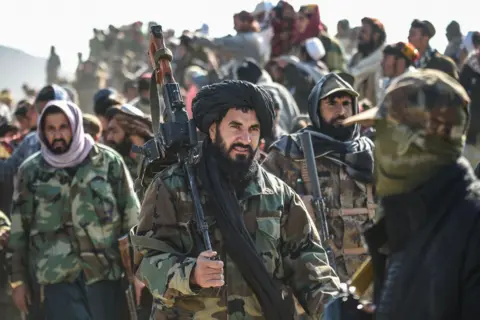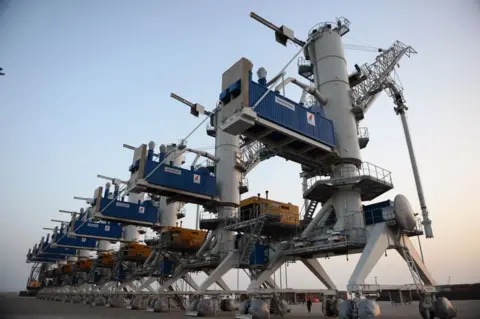Why is India reaching out to Taliban now?

 in india
in indiaIndia’s latest diplomatic reach out to Afghanistan’s Taliban government signals a remarkable shift in the way it views the geopolitical reality in the region.
This comes more than three years after India suffered a major strategic and diplomatic setback Kabul fell to Taliban,
Afghanistan’s two decades of investment in democracy – through military training, scholarships and landmark projects like the construction of its new parliament – were rapidly eroded. The decline also paved the way for greater influence by regional rivals, particularly Pakistan and China, weakening India’s strategic hold and raising new security concerns.
Still, last week signaled a change. India’s top diplomat Vikram Misri met Taliban’s acting foreign minister Amir Khan Muttaki in Dubai – the highest level engagement since the fall of Kabul. The Taliban expressed interest in strengthening political and economic ties with India, describing it as an “important regional and economic power”.
The talks reportedly focused on increasing trade and taking advantage of Iran’s Chabahar port, which India is developing to bypass Pakistan’s Karachi and Gwadar ports.
How important is this meeting? Michael Kugelman of the Wilson Center, a US think tank, told me that Delhi has now given the Taliban leadership the real legitimacy it had sought from the international community since its return to power.
He says, “The fact that this behavior is coming from India – a country that has never had friendly relations with the Taliban before, makes it even more significant, and also a diplomatic victory for the Taliban. “
 AFP
AFPSince the return of the Taliban to power in Afghanistan, countries have taken different approaches to governance, balancing diplomatic engagement with concerns over human rights and security. For example, China has gone much further: it has actively engaged with the Taliban, focusing on security and economic interests, and has even an ambassador In the country.
No country has formally recognized the Taliban government, but more than 40 countries maintain some form of diplomatic or informal relations with it.
This is why experts like former Indian Ambassador to Afghanistan Jayant Prasad are more cautious about India’s reach.
He says that for the last three years, India has maintained contact with the Taliban through a Foreign Service diplomat. India closed its consulates in Afghanistan during the civil war in the 1990s and reopened them in 2002 after the war ended. “We didn’t want this gap to develop again, so we wanted to connect. This is a big step in relationships,” he says.
India has “Historical and civilizational relationsForeign Minister S. Provided thousands of scholarships to students and built a new Parliament building.
This reflects an enduring geopolitical reality. The Indian Express newspaper said, “Whatever the nature of the regime in Kabul – monarchical, communist or Islamist – there has been a natural warmth between Delhi and Kabul.” noted,
Mr. Kugelman echoes this sentiment. “India has an important legacy as a development and humanitarian aid donor in Afghanistan, which has translated into public goodwill with the Afghan people, which Delhi does not want to lose,” he says.
Interestingly, relations with Delhi seem to be easing amid rising tensions between Afghanistan and Pakistan. Pakistan claims that the radical Pakistani Taliban (TTP) operates from safe havens in Afghanistan.
Last July, Pakistan’s Defense Minister Khawaja Asif told BBC that Pakistan would do so continue attacks on afghanistan As part of an operation aimed at countering terrorism. Dozens of people were killed in Pakistani air strikes in eastern Afghanistan, days before talks between India and the Taliban, according to the Afghan government. The Taliban government condemned the attacks, calling them a violation of its sovereignty.
 AFP
AFPIt marks a sharp deterioration in relations since the fall of Kabul in 2021, when a top Pakistani intelligence official was one of the first foreign guests to meet the Taliban regime. At the time, many saw the fall of Kabul as a strategic blow to India.
“Although Pakistan is not the only factor behind India’s increased access to the Taliban, it is true that Delhi has got a major victory in its evergreen competition with Pakistan by getting closer to a long-standing important Pakistani asset, which is now Has turned into his former mentor,” Mr. Kugelman says.
There are other reasons to pursue outreach, too. India aims to strengthen connectivity and reach Central Asia, which it cannot reach directly by land due to Pakistan’s denial of transit rights. Experts say that Afghanistan is the key to this goal. One strategy is to cooperate with Iran on the development of the Chabahar port to improve access to Central Asia through Afghanistan.
“It is easier for Delhi to focus on the Afghanistan component of this plan by aligning more closely with the Taliban leadership,” says Mr Kugelman, who is fully behind India’s plans as they look to enhance their trade and connectivity links to Afghanistan. “Will help.”
 getty images
getty imagesClearly, India’s recent outreach helps advance its core interests in Taliban-led Afghanistan: curbing terrorism threats to India, deepening connectivity with Iran and Central Asia, through assistance to public To maintain goodwill and confront the struggling Pakistan.
What about the negative sides?
“The main risk of strengthening relations with the Taliban is the Taliban itself. We are talking about a violent and brutal actor with close ties to international – including Pakistani – terrorist groups, which has itself Very little has been done to improve it,” Mr. Kugelman says.
“India may hope that if it keeps the Taliban on its side, the Taliban will be less likely to undermine India or its interests. And that may be true. But at the end of the day, do you really want a Can the actors be trusted like the Taliban? This will be a troubling question looming over India as it navigates this complex relationship cautiously.
Despite concerns over the Taliban’s behavior towards women, Mr Prasad sees no downside to India’s ongoing engagement with Afghanistan. “The Taliban are completely in control. Letting the Taliban wallow in their own juice will not help the Afghan people. Some engagement with the international community could put pressure on the government to improve its behavior.”
“Remember, the Taliban are yearning for recognition,” says Mr Prasad. “They know that will only happen after internal reforms.” Such as bringing women back into public life and restoring their rights to education, work and political participation.






